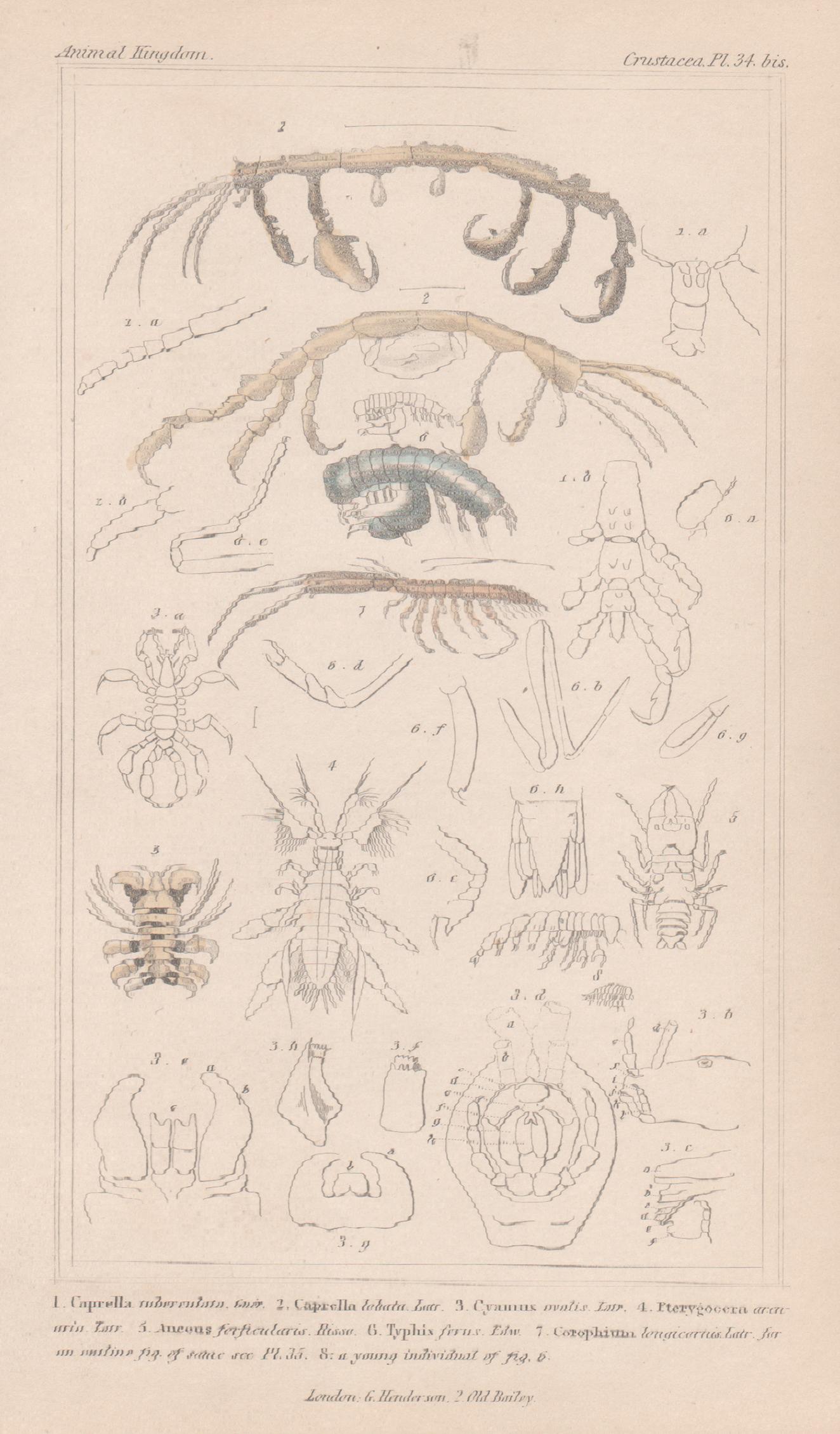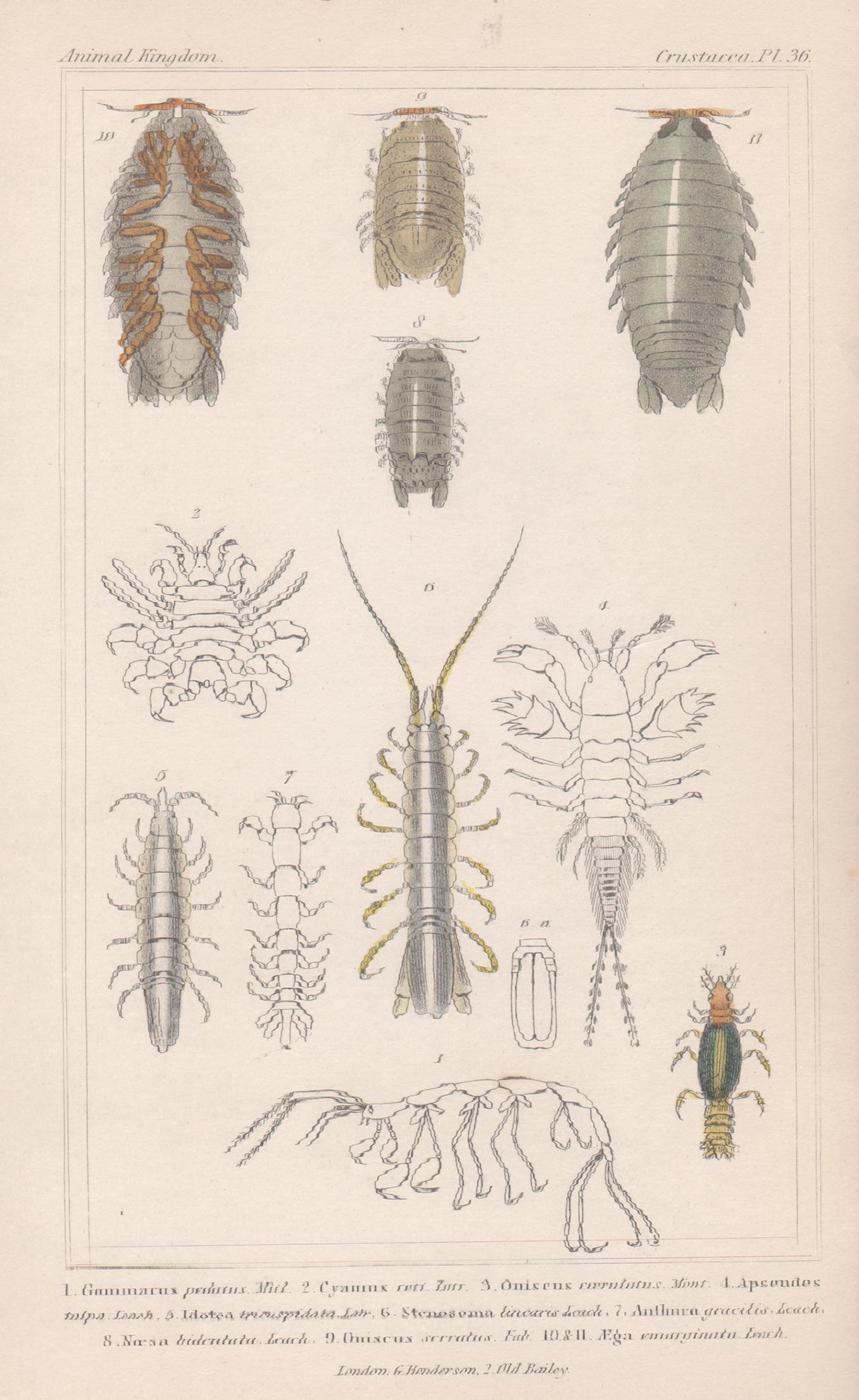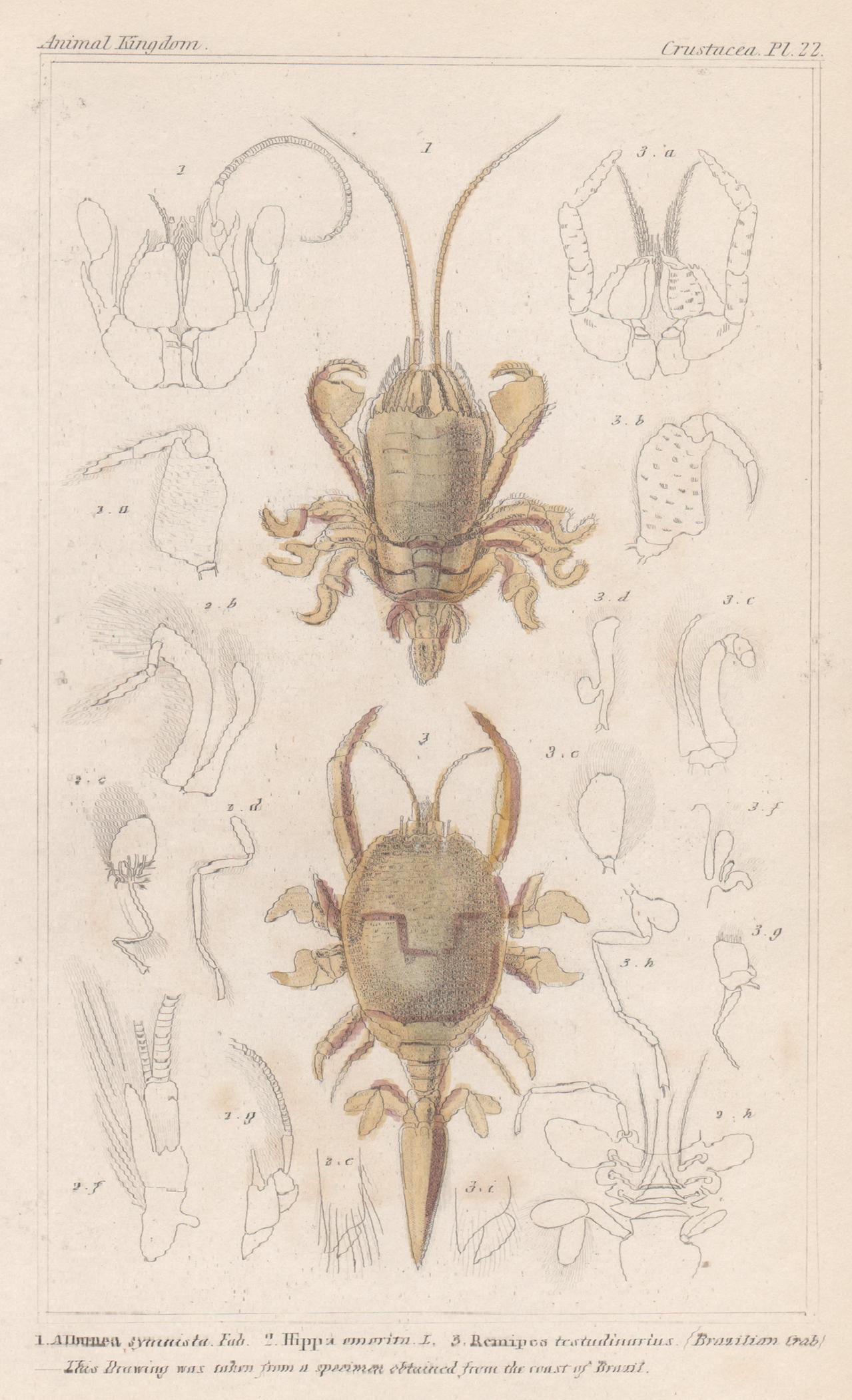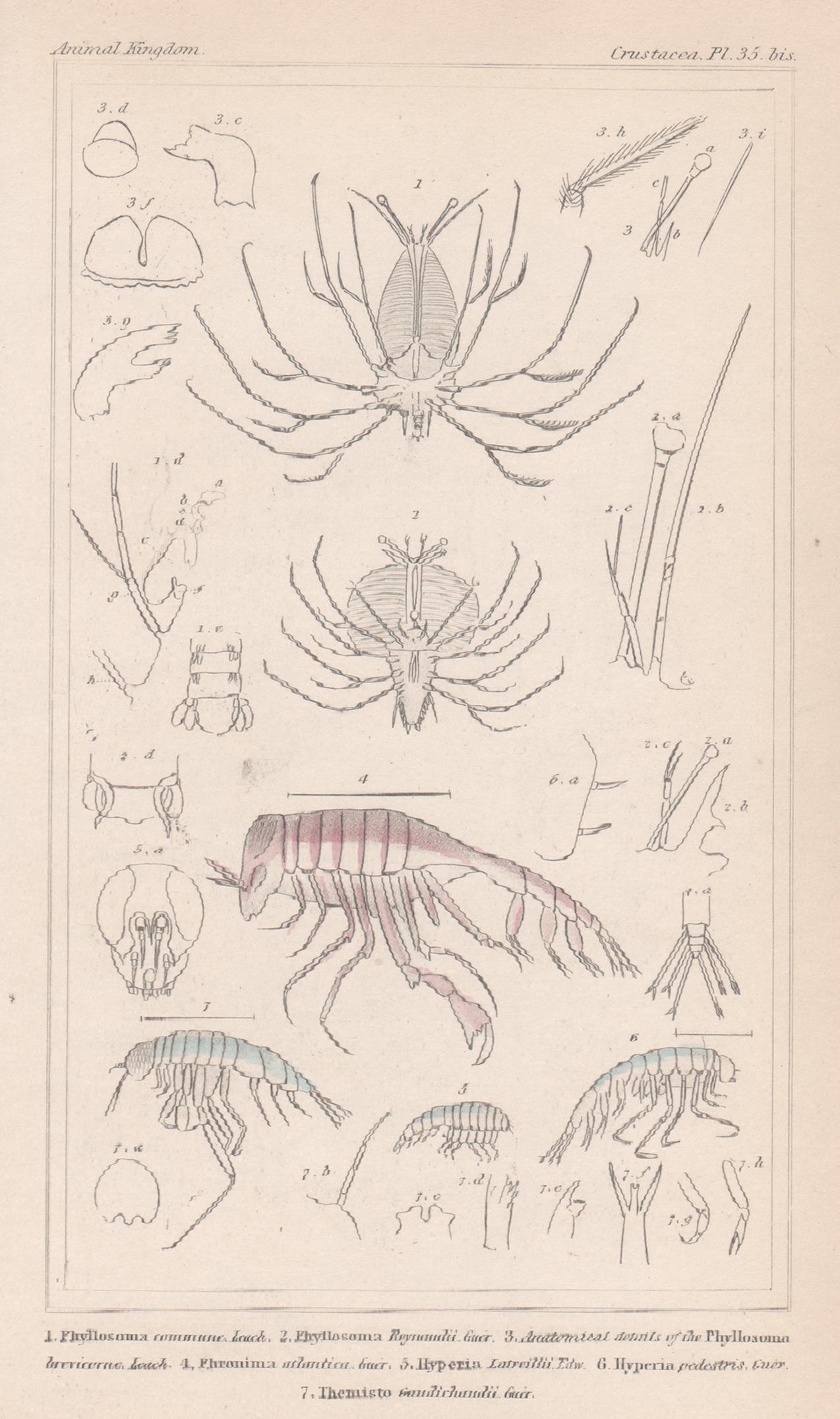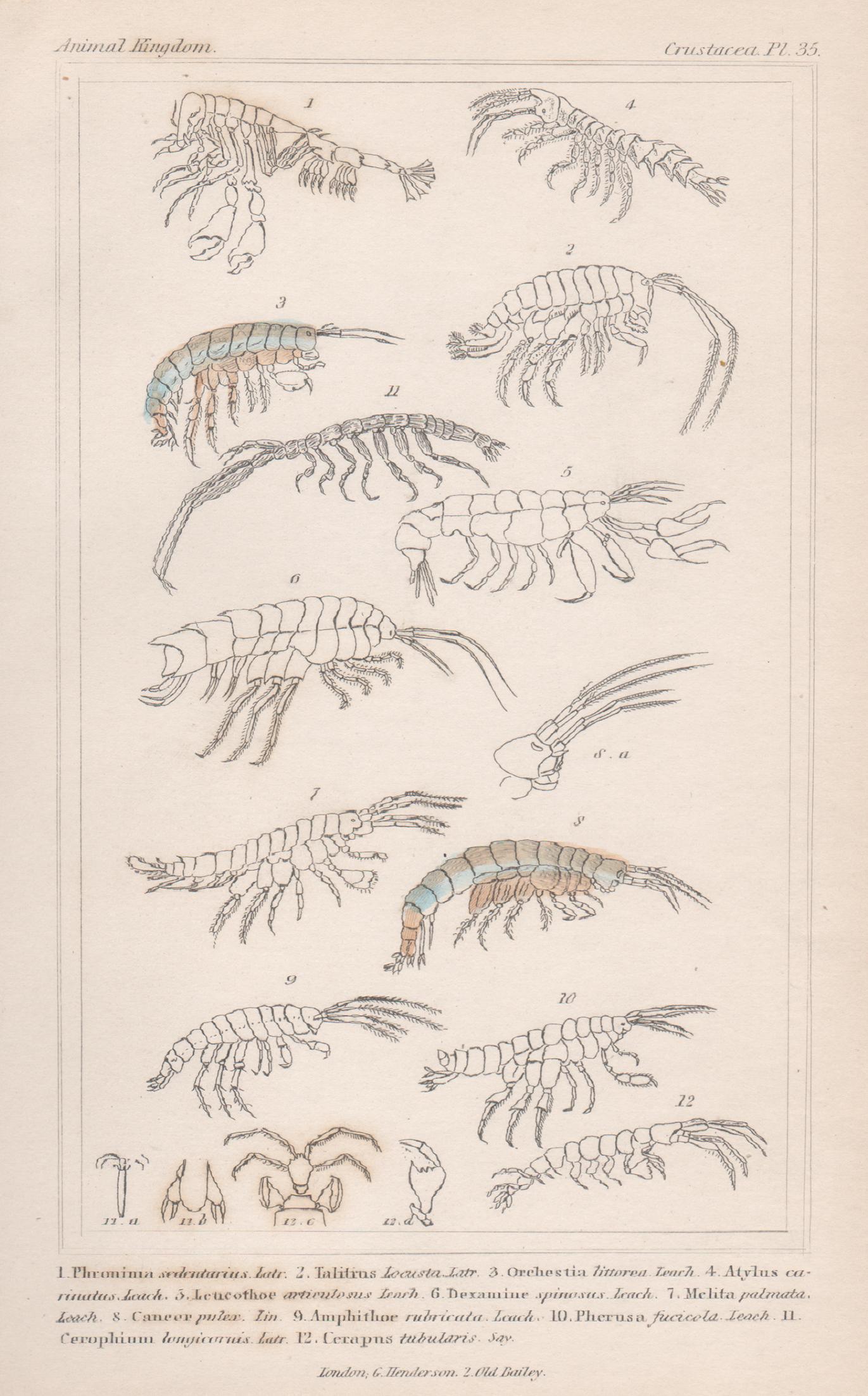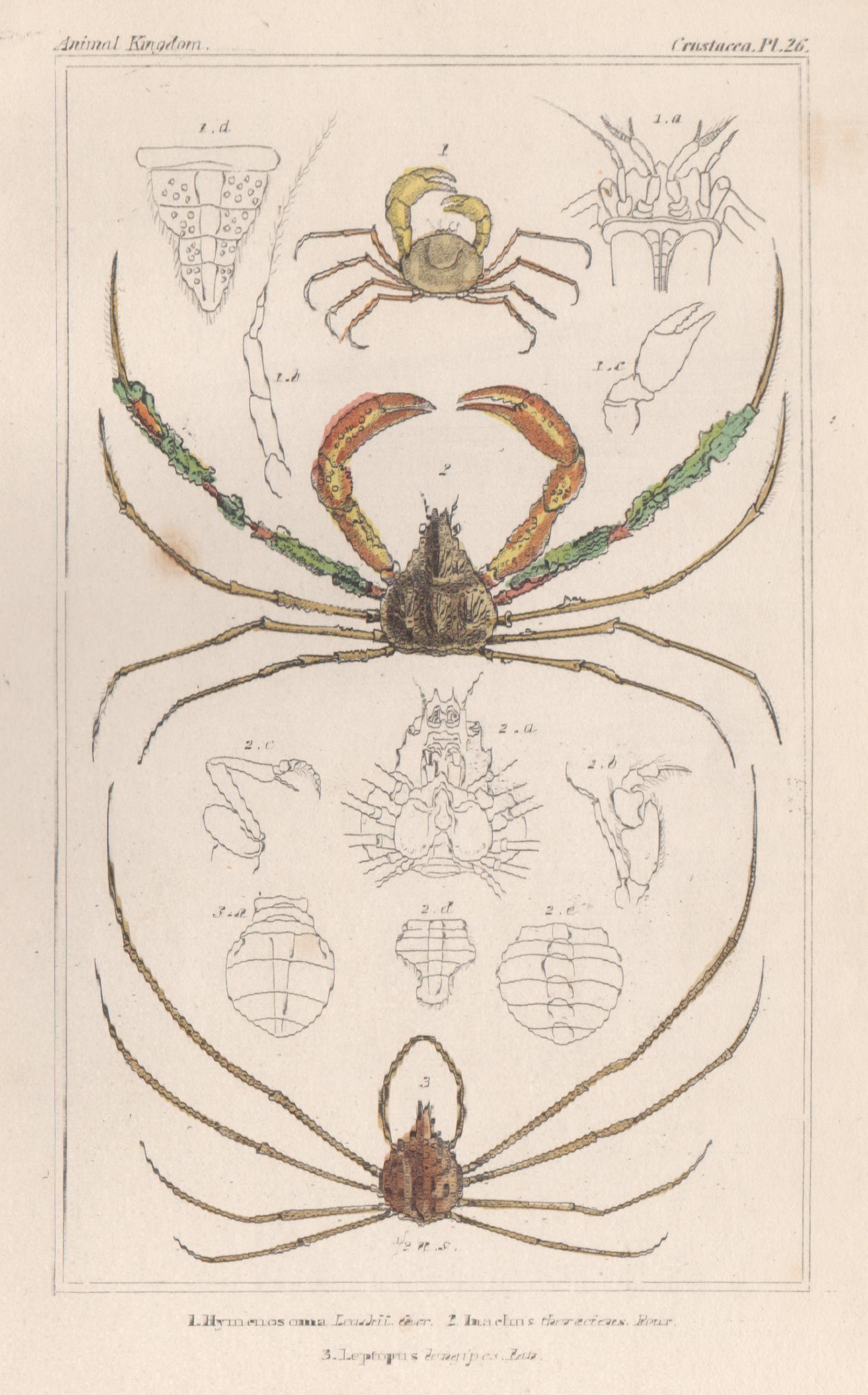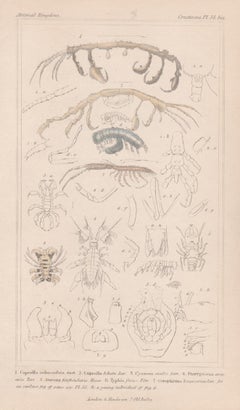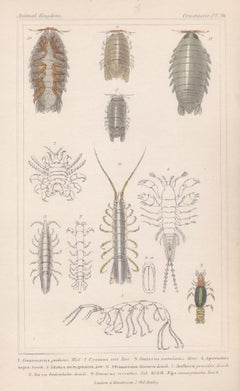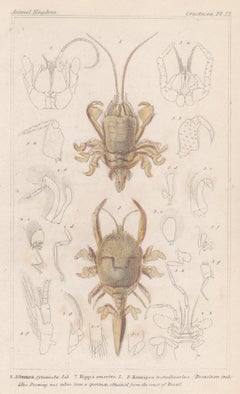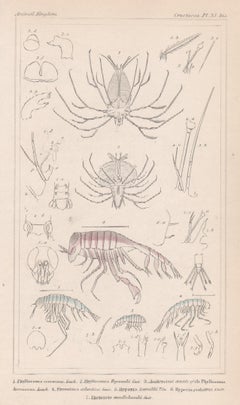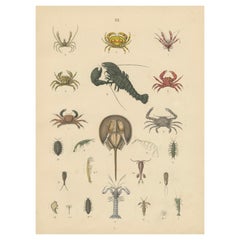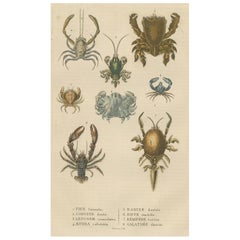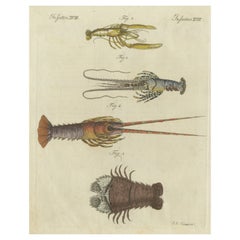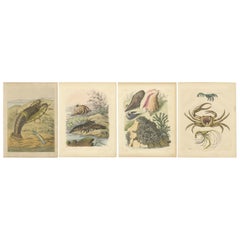Items Similar to Crustaceans - lobsters, antique English natural history engraving print, 1837
Want more images or videos?
Request additional images or videos from the seller
1 of 3
UnknownCrustaceans - lobsters, antique English natural history engraving print, 18371837
1837
$70
£52.83
€60.48
CA$98.72
A$108.39
CHF 56.55
MX$1,311.62
NOK 708.70
SEK 667.79
DKK 451.46
About the Item
'Crustacea'
Copper-line engraving with original hand-colouring. From Baron Georges Cuvier's (1769-1832) 'Animal Kingdom', published in London in 1837.
210mm by 130mm (sheet)
- Creation Year:1837
- Dimensions:Height: 8.27 in (21 cm)Width: 5.12 in (13 cm)
- Medium:
- Movement & Style:
- Period:
- Condition:A couple of faint spots in the image.
- Gallery Location:Melbourne, AU
- Reference Number:1stDibs: LU124428808682
About the Seller
5.0
Platinum Seller
Premium sellers with a 4.7+ rating and 24-hour response times
Established in 2005
1stDibs seller since 2019
613 sales on 1stDibs
Typical response time: <1 hour
- ShippingRetrieving quote...Shipping from: Melbourne, Australia
- Return Policy
Authenticity Guarantee
In the unlikely event there’s an issue with an item’s authenticity, contact us within 1 year for a full refund. DetailsMoney-Back Guarantee
If your item is not as described, is damaged in transit, or does not arrive, contact us within 7 days for a full refund. Details24-Hour Cancellation
You have a 24-hour grace period in which to reconsider your purchase, with no questions asked.Vetted Professional Sellers
Our world-class sellers must adhere to strict standards for service and quality, maintaining the integrity of our listings.Price-Match Guarantee
If you find that a seller listed the same item for a lower price elsewhere, we’ll match it.Trusted Global Delivery
Our best-in-class carrier network provides specialized shipping options worldwide, including custom delivery.More From This Seller
View AllCrustaceans, antique English natural history engraving print, 1837
Located in Melbourne, Victoria
'Crustacea'
Copper-line engraving with original hand-colouring. From Baron Georges Cuvier's (1769-1832) 'Animal Kingdom', published in London in 1837.
210mm by 130mm (sheet)
Category
Mid-19th Century Naturalistic Animal Prints
Materials
Engraving
Crustaceans, antique English natural history engraving print, 1837
Located in Melbourne, Victoria
'Crustacea'
Copper-line engraving with original hand-colouring. From Baron Georges Cuvier's (1769-1832) 'Animal Kingdom', published in London in 1837.
210mm by 130mm (sheet)
Category
Mid-19th Century Naturalistic Animal Prints
Materials
Engraving
Crustaceans - crabs, antique English natural history engraving print, 1837
Located in Melbourne, Victoria
'Crustacea'
Copper-line engraving with original hand-colouring. From Baron Georges Cuvier's (1769-1832) 'Animal Kingdom', published in London in 1837.
210mm by 130mm (sheet)
Category
Mid-19th Century Naturalistic Animal Prints
Materials
Engraving
Crustaceans - shrimps, antique English natural history engraving print, 1837
Located in Melbourne, Victoria
'Crustacea'
Copper-line engraving with original hand-colouring. From Baron Georges Cuvier's (1769-1832) 'Animal Kingdom', published in London in 1837.
210mm by 130mm (sheet)
Category
Mid-19th Century Naturalistic Animal Prints
Materials
Engraving
Crustaceans, antique English natural history engraving print, 1837
Located in Melbourne, Victoria
'Crustacea'
Copper-line engraving with original hand-colouring. From Baron Georges Cuvier's (1769-1832) 'Animal Kingdom', published in London in 1837.
210mm by 130mm (sheet)
Category
Mid-19th Century Naturalistic Animal Prints
Materials
Engraving
Crustaceans - crabs, antique English natural history engraving print, 1837
Located in Melbourne, Victoria
'Crustacea'
Copper-line engraving with original hand-colouring. From Baron Georges Cuvier's (1769-1832) 'Animal Kingdom', published in London in 1837.
210mm by 130mm (sheet)
Category
Mid-19th Century Naturalistic Animal Prints
Materials
Engraving
You May Also Like
Crustaceans & Marine Invertebrates Print: Crab, Lobster, Horseshoe Crab - 1867
Located in Langweer, NL
Crustaceans & Marine Invertebrates Print: Crab, Lobster, Horseshoe Crab – Antique 1867
This detailed antique print depicts a diverse range of crustaceans and marine invertebrates, including crabs, lobsters, shrimps, barnacles, copepods, and the horseshoe crab, rendered in fine hand-coloured engravings. It originates from the Atlas der Natuurlijke Geschiedenis voor scholen en huisgezinnen, adapted into Dutch by T.C. Winkler after Traugott Bromme, and published in Amsterdam by J.C. Loman in 1867. Designed for educational use, this plate introduced 19th-century students to marine biology and invertebrate diversity.
The labelled figures include:
1. Shore crab (Carcinus maenas)
2. Blue crab (Callinectes sapidus)
3. Spider crab (Maja squinado)
4. Red rock crab (Cancer productus)
5. Fiddler crab (Uca species)
6. Mosaic crab (Lophozozymus pictor)
7. Porcelain crab (Porcellanidae species)
8. Lobster (Homarus gammarus)
9. Branchiopod (Branchiopoda species)
10. Mantis shrimp (Stomatopoda species)
11. Krill (Euphausiacea species)
12. Barnacle larva (Cirripedia species)
12a. Nauplius stage
12b. Cypris stage
13. Amphipod (Amphipoda species)
14. Isopod (Isopoda species)
15. Water flea (Daphnia species)
16. Cyclops copepod (Cyclopoida species)
16a. Adult copepod
16b. Egg stage
17. Horseshoe crab (Limulus polyphemus)
18. Fairy shrimp (Anostraca species)
19. Copepod (Copepoda species)
20. Ostracod (Ostracoda species)
21. Harpacticoid copepod (Harpacticoida species)
22. Barnacle cypris larva
Produced using copper engraving with meticulous hand colouring, the print shows fine anatomical lines and vibrant detailing, highlighting each species' structure, limb arrangement, and carapace shape. Each invertebrate is illustrated systematically for easy comparative study, reflecting 19th-century natural history educational standards before photographic field guides were available.
Condition summary:
Good condition for its age, with slight toning and minor scattered foxing mainly in the margins. The paper remains strong with no tears or repairs, and the hand colouring is vivid and well-preserved.
Framing tips:
Frame this marine biology print...
Category
Antique 1860s German Prints
Materials
Paper
Crustacean Varieties in Drapiez's Natural Sciences Dictionary, 1845
Located in Langweer, NL
This original hand-colored antique engraving appears to depict a variety of crustaceans, which are characterized by their hard exoskeletons, segmented bodies, and jointed limbs. Each...
Category
Antique 1840s Prints
Materials
Paper
$337 Sale Price
20% Off
Original Antique Print of a various Lobster and Shrimp
Located in Langweer, NL
This original antique print shows the Slipper lobster, Scyllarides squammosus 1, homard lobster, Homarus gammarus 2, pitu shrimp, Macrobrachium carcinus 3, and spiny lobster...
Category
Antique Early 19th Century Prints
Materials
Paper
$269 Sale Price
20% Off
Antique Marine Prints – Lobster, Crabs, Shells, and Mollusks, circa 1850
Located in Langweer, NL
Antique Marine Prints – Lobster, Crabs, Shells, and Mollusks, c.1840s–1850s
A striking set of four original hand-colored lithographs depicting m...
Category
Antique Mid-19th Century German Prints
Materials
Paper
Antique Colored Print of a Crab and Lobster, 1854
Located in Langweer, NL
Antique print titled 'Crabe, Homard'. Print of a crab and lobster. This print originates from 'Musée d'Histoire Naturelle' by M. Achille Comte.
Artists and Engravers: Published b...
Category
Antique 19th Century Prints
Materials
Paper
$183 Sale Price
20% Off
Fascinating Crustaceans and Marine Anatomy: Hand-Colored 19th-Century Engraving
Located in Langweer, NL
Title: Fascinating Crustaceans and Marine Anatomy: Hand-Colored 19th-Century Engraving from Bertuch’s Bilderbuch für Kinder
Description:
This engaging hand-colored copperplate e...
Category
Antique Early 1800s Prints
Materials
Paper
More Ways To Browse
Natural History Prints
English Engravings
Lobster Antique
Poster Aesthetic Vintage Art
Prairie Dog
Signed Duck Art Prints
Simon Bussy
Strato Lounger
Tete De Taureau
Tortoise And Hare Vintage
Ulisse Aldrovandi
Vintage Fetish Shoes
Albion Printing Press
Andy Warhol Pussy
Audubon Hawk
Audubon Puffin
Azoulay Art Horses
Banksy Greenpeace
